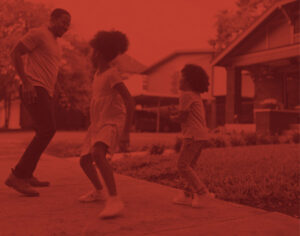
2024 Annual Report
OPENING DOORS to opportunity
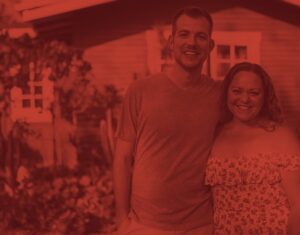
GMHF supports the creation of STRONG COMMUNITIES and AFFORDABLE HOMES through strategic investments and effective partnerships.
Letter From the President and Board Chair
Greater Minnesota Housing Fund (GMHF) is proud to share our accomplishments in 2024. We continue to lead with our many strengths: nimbleness, creativity, a strong balance sheet, and our focus on innovation and strategic partnerships.
GMHF and Minnesota Equity Fund (MEF) investment in affordable housing continues to grow. In 2024, GMHF and MEF financed a combined 2,240 affordable housing units through lending and syndication, over a 50% increase from 2023.
GMHF invests in a strong affordable housing ecosystem throughout Minnesota. In 2024, we provided extensive technical assistance to loan applicants and borrowers, rural and Tribal communities, emerging developers, and healthcare organizations seeking to invest in housing. We expanded partner engagement, supporting dozens of new affordable housing projects in rural and Tribal communities, including a new wealth building homeownership model developed by Leech Lake Financial Services in Cass Lake and Deer River.
In 2024, we launched our Energy Lending Initiative to drive efficiency, independence, and affordability in housing throughout Minnesota. Our Housing and Health Initiative (HHI) kicked off a new Housing Stability Coalition last year that included participation from nine healthcare systems to create a collective voice from the healthcare sector for housing as a key social determinant of health and identify opportunities for healthcare systems to invest in affordable housing.
We also fully capitalized the second phase of our NOAH Impact Fund, an innovative and nationally recognized model designed to preserve naturally occurring affordable housing (NOAH). Preserving the affordability and quality of this housing is critical to preserving housing stability for thousands of Minnesota residents.
GMHF operates in a housing sector that has experienced significant distress caused by the economic impacts of the COVID-19 pandemic, high inflation and interest rates, rising insurance costs, increased supportive service needs, and continued economic stress on low-income residents. GMHF partnered with the Family Housing Fund to help create the Minnesota Housing Stability Coalition to bring the sector back to health, support the housing stability of residents, and ensure continued capacity to meet housing production needs.
We invite you to learn more about our work and impact in this report. In 2025, we look forward to welcoming you to our new office location at the Court International Building in Saint Paul.
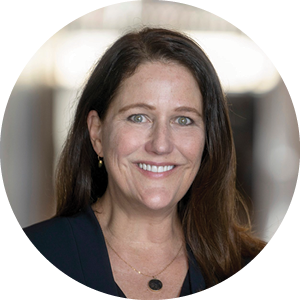

Andrea Brennan
President & CEO
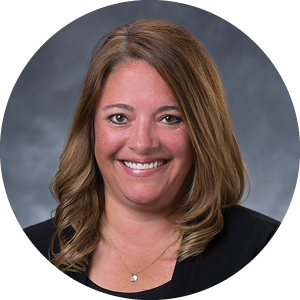

Stephanie Cummings
Board Chair
$52.2M
of Loans Closed in 2024
2,240
Affordable Housing Units Financed in 2024
$663.3M
Total Development Costs in 2024*
*Total Development Costs (or capital mobilized) refers to all other loans and investments received for a development, over and above GMHF’s investment.

Every HOME counts.
Solutions that span the housing continuum.
Affordable Housing Impact
With a critical shortage of affordable housing and the loss of existing affordable housing, GMHF knows that every home counts. In 2024, GMHF supported predevelopment, planning, strategy, and financing plans for housing production and preservation throughout the state. This means supporting a healthy housing continuum that includes strategies to end and prevent homelessness, produce and preserve affordable and workforce housing, and foster sustainable homeownership opportunities.
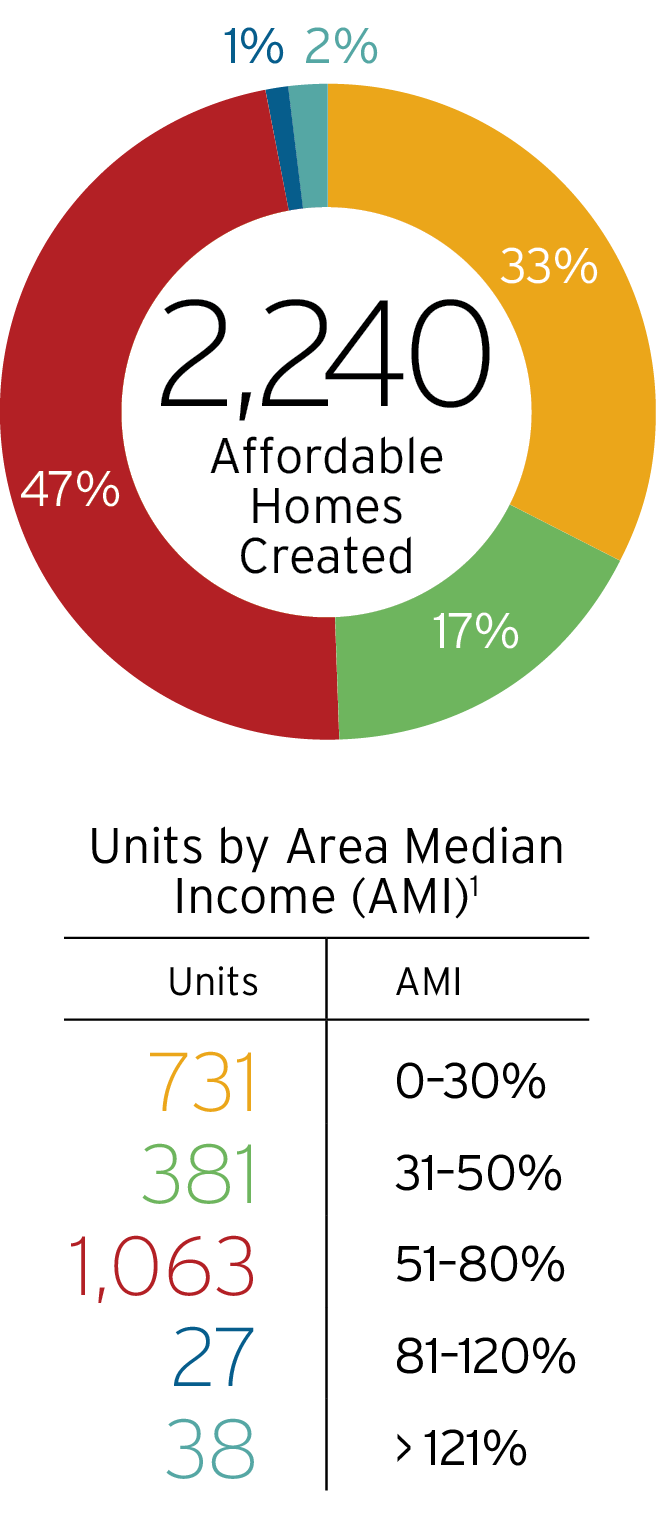
5,600
Residents Housed
$52.2M
Loans Closed
$39.1M
Equity Capital Mobilized2
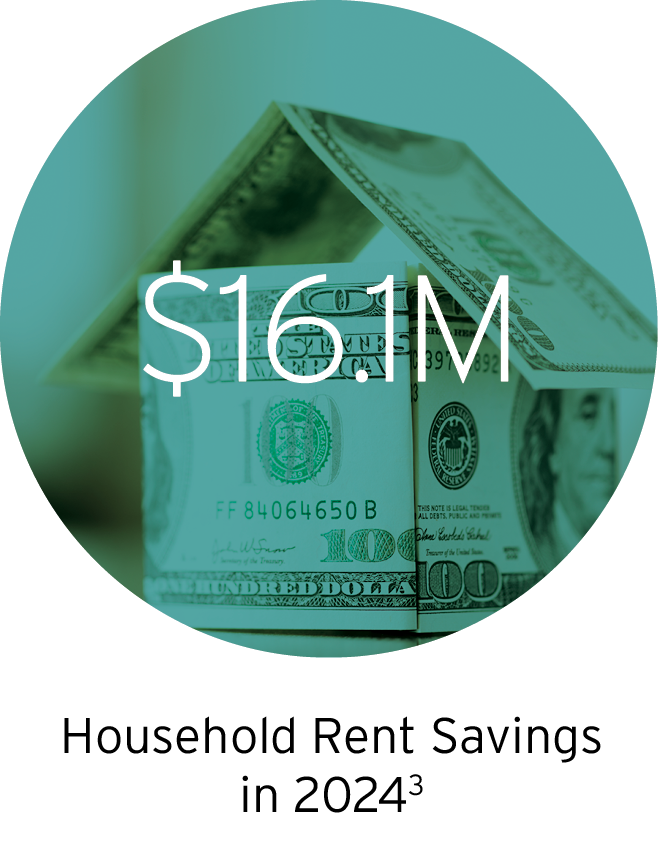
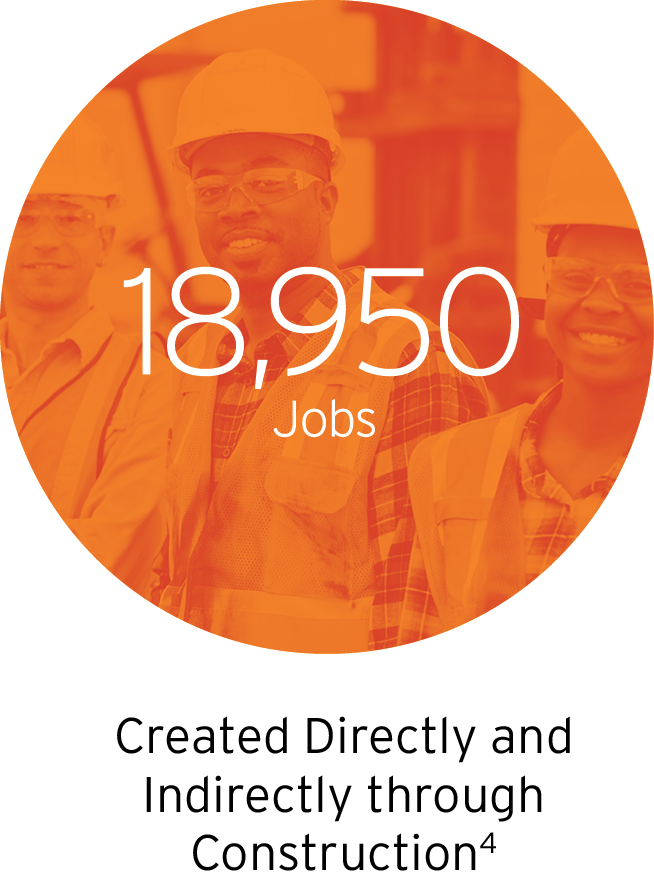
1 AMI is calculated by county. In 2024, AMIs by county for a family of 4 in MN ranged from $67,400 to $124,200 and averaged $96,917
2 Through Minnesota Equity Fund Low-Income Housing Tax Credits.
3 Across 2,240 units created in 2024, tenants averaged a rent savings of $600 per household per month, or $7.2K per year.
4 This is an industry standard, Community Development Financial Institution (CDFI) Fund calculation. Based on total development costs of all lending and investing, which was about $66.3M in 2024, divided by $35,000, approximately 18,950 jobs were created directly and indirectly from development projects

Housing Solutions in KEY IMPACT AREAS
We’ve identified four impact areas to address stable housing needs on the continuum of income and experiences in Minnesota communities. GMHF supported projects and policy that made an impact across these areas.
STABLE HOMES
We finance the production and preservation of homes because they are the foundation for child development, school achievement, career success, and healthy families.

TARGETED COMMUNITY INVESTMENT
We partner with local communities to invest in housing that revitalizes neighborhoods, spurs reinvestment, and supports economic development, meeting the unique needs of each community.

STRONG COMMUNITIES & WEALTH BUILDING
We work with local and regional housing and community partners to create stronger communities and build generational wealth through homeownership and real estate development.
MINNESOTA INDIAN WOMEN’S RESOURCE CENTER
MINNEAPOLIS, MN
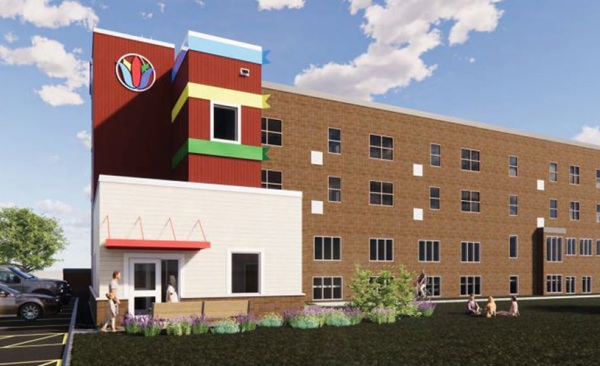
Minnesota Indian Women’s Resource Center (MIWRC) is a 24-unit permanent supportive housing project serving Native women and two-spirit people with incomes at or below 30% AMI, including those experiencing homelessness and people with disabilities. Residents receive services such as chemical dependency treatment, mental health care, family stabilization services; and employment, education, and cultural resilience training.
The building was originally built in 1950 and required substantial rehabilitation to address health and safety concerns, meet current building codes and ADA-accessibility standards, and provide a functional space for residents and clients.

TWIN OAKS DEVELOPMENT
FARIBAULT, MN
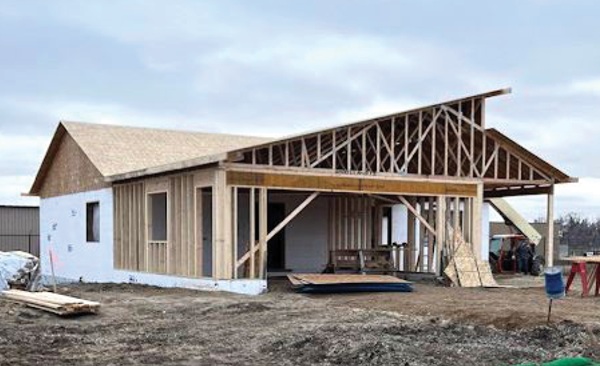
Twin Oaks in Faribault includes six new, for-sale homes developed by Rice County Habitat for Humanity (HFH). The project is a collaboration between Rice County HFH, Rice County Housing and Redevelopment Authority (HRA), and Three Rivers Community Action. Homebuyers with incomes at or below 80% of the area median income will purchase these new homes.

SANDY PINES AND BRAHAM MEADOWS
SANDSTONE AND BRAHAM, MN
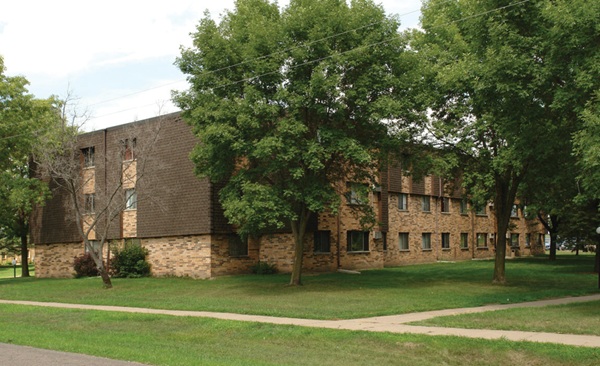
Sandy Pines Apartments and Braham Meadows, acquired by METIS Development Group, have a total of 84 units. All units are subsidized by a Section 8 rental assistance contract and residents pay no more than 30% of their income toward rent, making these units affordable at all income levels. METIS Development Group is making substantial renovations to these properties to preserve the affordability and quality of this critical housing stock in Greater Minnesota.



POLICY & SYSTEMS CHANGE
We work to advance housing policies and systems change to improve access and opportunity, while enhancing effectiveness of public and private sector institutions leveraging new capital resources to address housing needs.
SUPPORTING POLICIES THAT
ADVANCE MINNESOTA’S HOUSING CONTINUUM
GMHF was founded to support a strong affordable housing ecosystem in Minnesota. In addition to our lending, equity investment, and programmatic work, this means we work closely with policymakers, housing providers, and advocates to provide data-driven insights and practical solutions that advance housing affordability across the State of Minnesota. Our policy work focuses on education, collaboration, and sharing insights from our on-the-ground affordable housing experts. GMHF supports research, case studies, and convenings focused on bringing together partners to advance shared goals.
MINNESOTA HOUSING STABILITY COALITION
With the support of GMHF, the Minnesota Housing Stability Coalition came together in 2024 to address significant threats to the stability of low-income residents of regulated affordable housing due to precipitously increasing operating costs. More than 70 people from 35 nonprofit housing organizations and philanthropies statewide have engaged in the Coalition to support the tens of thousands of Minnesotans who depend on affordable rental housing. GMHF supported a series of qualitative and quantitative reports to understand the full scale of the distressed affordable housing problem in Minnesota.
Thanks to the Coalition’s advocacy during the 2024 legislative session, the State created a new “recapitalization” fund to invest in the stabilization of distressed affordable housing properties and created the Task Force on the Long-Term Sustainability of Affordable Housing. The Task Force was charged with delivering actionable recommendations to improve the long-term sustainability of affordable housing to the Legislature in February 2025. The Task Force successfully delivered those recommendations, which will inform funding and policy changes in 2025 and beyond.
DRIVING ENERGY EFFICIENCY, INDEPENDENCE, AND AFFORDABILITY
In early 2024, GMHF launched its Energy Lending Initiative with a focus on leveraging local, state, and federal resources in Minnesota’s affordable housing ecosystem. A market study indicated that GMHF was well positioned to serve as a trusted advisor for a housing industry transitioning to a greener future.
GMHF was selected as one of 26 Community Development Financial Institutions (CDFIs) nationwide advancing to the final round of the Opportunity Finance Network’s Clean Communities Investment Accelerator (CCIA) application, competing for $10M to launch green construction/bridge loans and green second mortgages.
With strong partnerships, a growing project pipeline, and increasing access to funding, GMHF is positioned to scale climate-friendly lending and help lead the transition to sustainable, affordable housing in Minnesota.
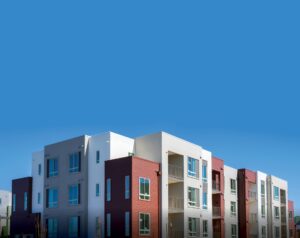
Housing Production, Investment and Grantmaking Since Inception

* Includes some duplication of units funded by both GMHF’s Revolving Loan Fund and Minnesota Equity Fund.
Grantmaking
$960.5K
in total grantmaking, including
$545K
for Emerging Developers Program grants.
More than just a lender, we work to support innovative housing solutions all over Minnesota. Grantmaking is one tool for supporting an ecosystem of impact for developers and grantee partners statewide. GMHF provided grants that advance our program areas as well as grants for projects and initiatives requiring timely response to support strategic initiatives that offer direct response to housing needs. Grant awards included:
HOUSING INSTITUTE 9
MINNESOTA HOUSING PARTNERSHIP
This initiative worked to close the gap between affordable units available and people who need them in rural communities. Housing leaders and stakeholders in Northeast Minnesota shared experiences, learned best practices, and developed creative solutions together over an 18-month period. Using a team-based model, the institute created lasting connections to support vibrant rural communities in the region.
ADVANCING HOMEOWNERSHIP
MN HOMEOWNERSHIP CENTER
Minnesota Homeownership Center (HOC) implements strategies to expand access to affordable homeownership for low- and moderate households throughout Minnesota. HOC supports the statewide network of homeownership education, counseling, and training providers and also providers its own counseling support for housing stability.
WEALTH BUILDING AND WORKFORCE DEVELOPMENT DEMONSTRATION PROGRAM
LEECH LAKE FINANCIAL SERVICES (LLFS)
This project will lead to the development of 15 new homes in communities across Itasca, Cass, Hubbard, and Beltrami counties that will be sold to households with incomes at or below 80% AMI. LLFS is a nonprofit corporation that operates as a separate entity from the Leech Lake Band Tribal government. Their mission is to promote the economic well-being of individuals and families by providing financial products and education grounded in trust, ethical practices, and Anishinaabe values. LLFS provides services to prospective homebuyers, including credit coaching, financial training and education, downpayment assistance, closing cost assistance, and homebuyer counseling. The project includes a new construction training and apprenticeship component that will provide living wage jobs in skilled trade occupations.
GMHF EMERGING DEVELOPERS GRANTS
We continued grantmaking through the Emerging Developers Program, supporting predevelopment, training, and education for developers creating community-driven solutions for all Minnesotans. The shortage of developer capacity continues to be a barrier to new housing development, especially in rural and Tribal communities in Greater Minnesota. GMHF awarded 15 predevelopment grants to help developers create and preserve 121 units of affordable housing in 11 Minnesota counties in 2024.
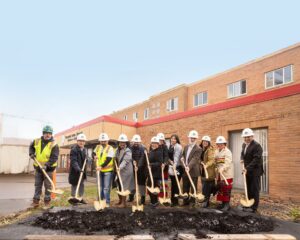
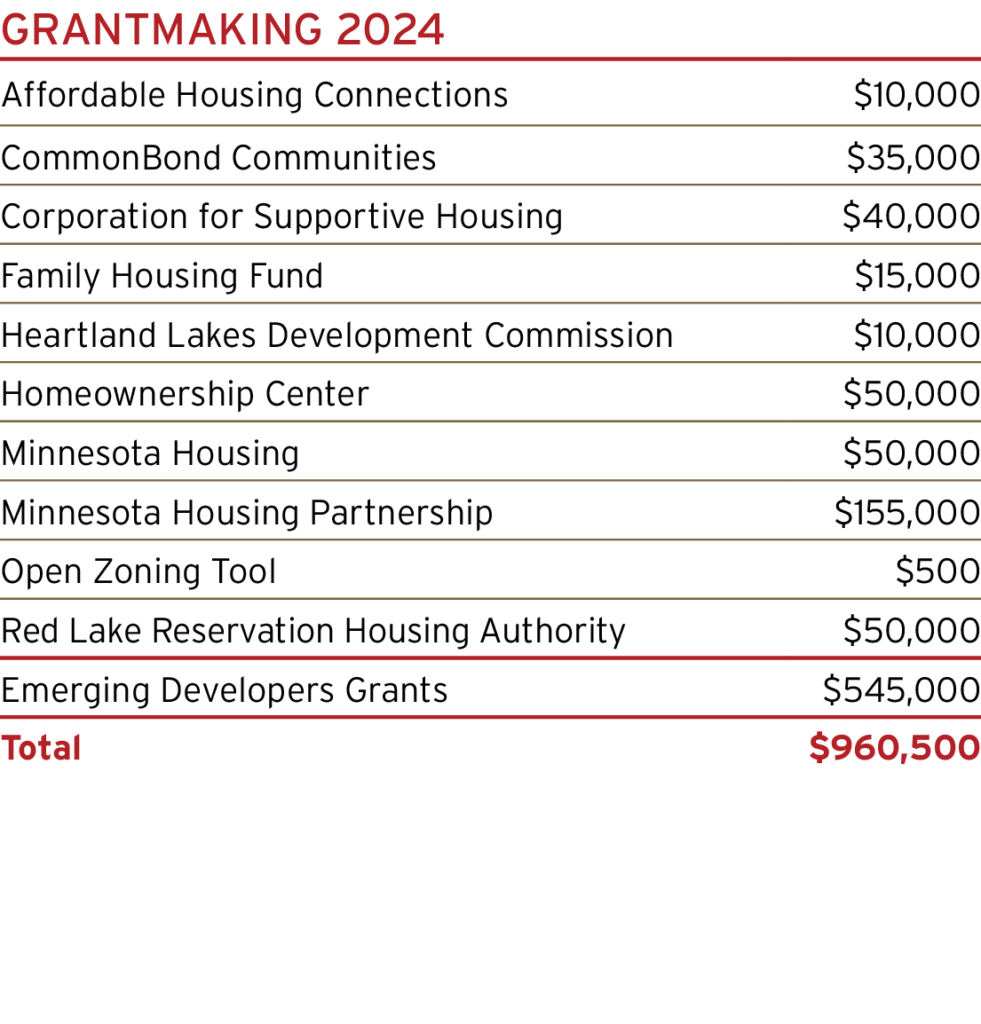
Regional Map of Minnesota
CREATING AND PRESERVING AFFORDABLE HOUSING IN MINNESOTA’S 87 COUNTIES
Since its inception in 1996, GMHF has invested:
$1.2B
in 200+ communities, creating
23,667
homes for families, children, and individuals in low-income, cost-burdened households. During this time, GMHF’s lending and investing across all funds has resulted in an estimated
$4.3B
total capital impact from GMHF’s lending and investing across all funds to date.
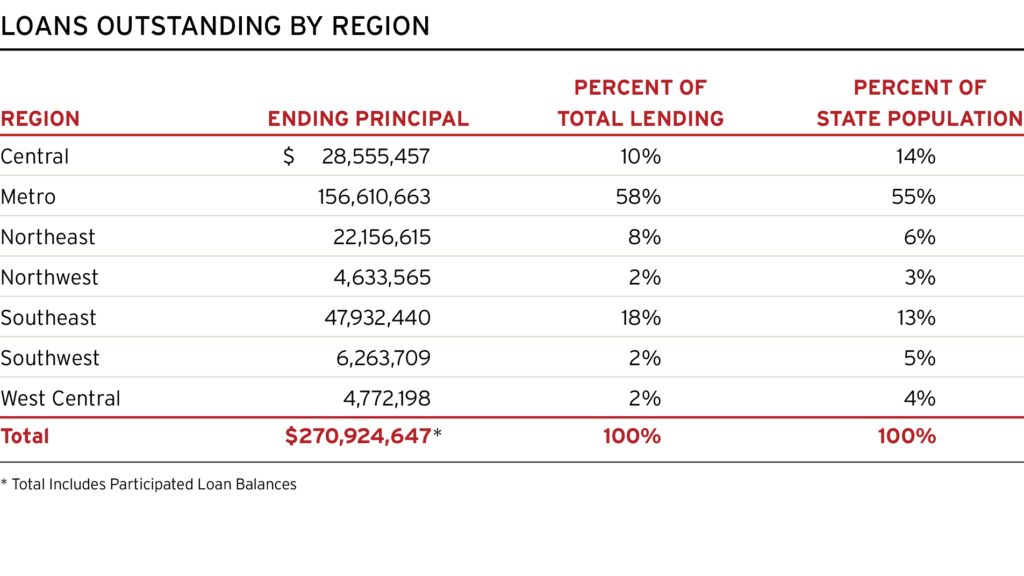
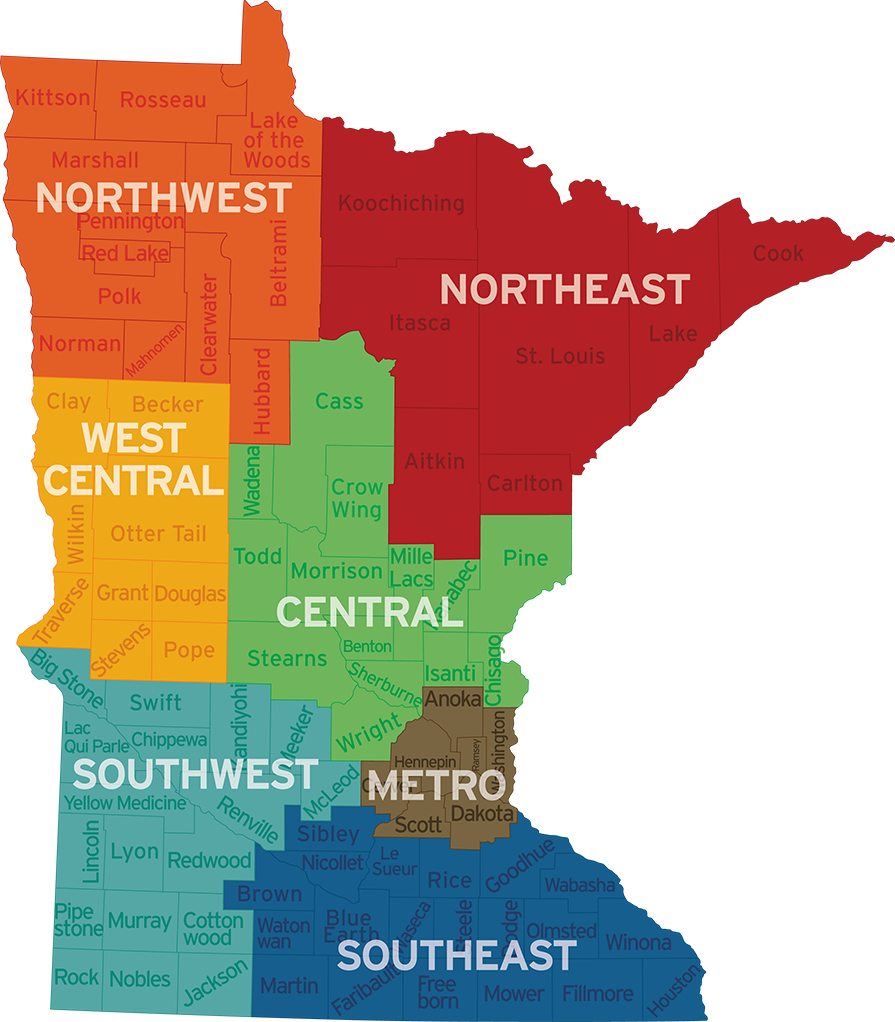
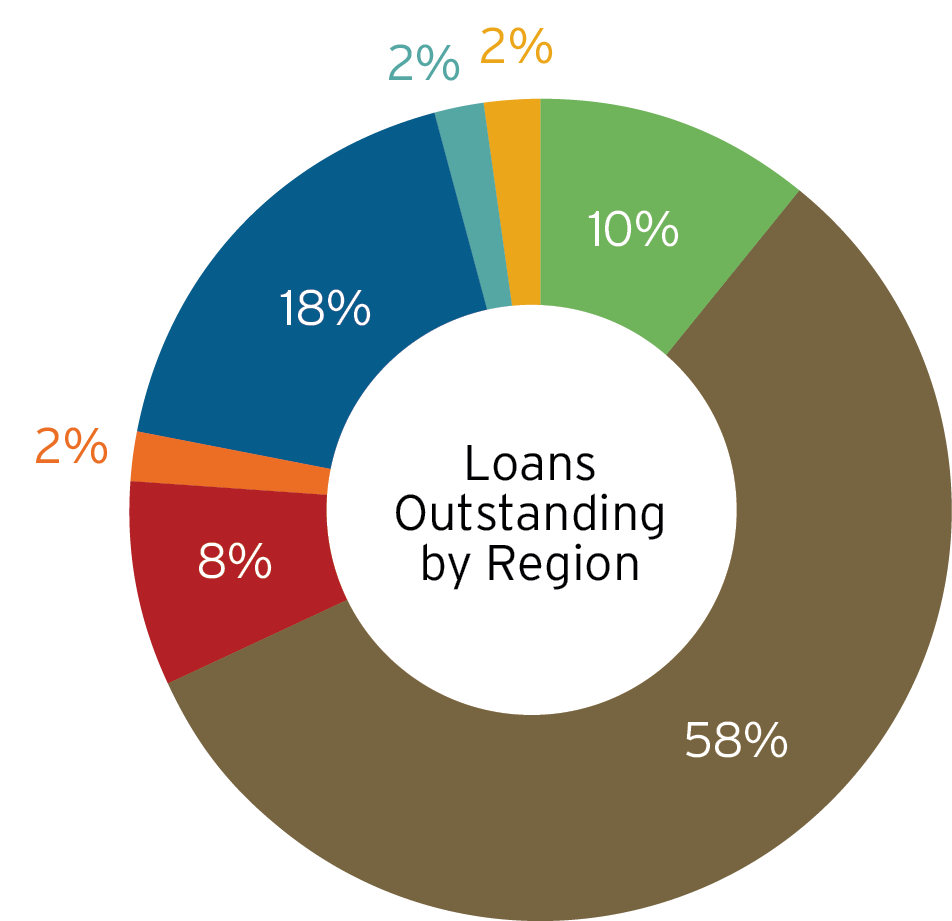
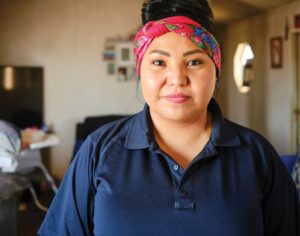
GMHF PROGRAMS and INITIATIVES
Creating informed, responsive housing solutions with a focus on responding to gaps in the affordable housing ecosystem.
Emerging Developers Program
Supporting community based emerging developers dedicated to creating and preserving affordable housing.
GMHF’s Emerging Developers Program (EDP) invests in growing Minnesota’s developer capacity to produce the homes Minnesotans need. Our EDP helps build the capacity of emerging developers to create and preserve more affordable housing throughout Minnesota.
Irene Ruiz-Briseño
Emerging Developers
Program Manager
iruizbriseno@gmhf.com
BUILDING CAPACITY AND RELATIONSHIPS
Since late 2021, GMHF has offered a suite of services through the EDP to build the capacity of emerging and diverse investors and developers within the affordable housing industry:
- Grantmaking: Direct financial assistance to emerging developers to enhance their capacity and ability to carry out affordable housing activities.
- Technical Assistance: Guidance for developers evaluating real estate development and funding opportunities, as well as post-closing support to provide best practices and troubleshooting challenges with property management, maintenance and repairs, and resident concerns.
- Education and Training: In response to the need for practical information tailored specifically for small NOAH properties, GMHF developed our New Property Owner Seminar and Small NOAH Proforma Training.
2024 PROGRAM EVALUATION
In 2024, the third year of the EDP, GMHF undertook an evaluation of the EDP along with our institutional partners that also support emerging developers. The evaluation will be completed in 2025 with a comprehensive report that outlines the challenges, opportunities, and recommendations needed to better support emerging developers, particularly those seeking to acquire and preserve the affordability of small NOAH properties. GMHF will refine the program based on the findings.

OPERA HOUSE
LONG PRAIRIE, MN
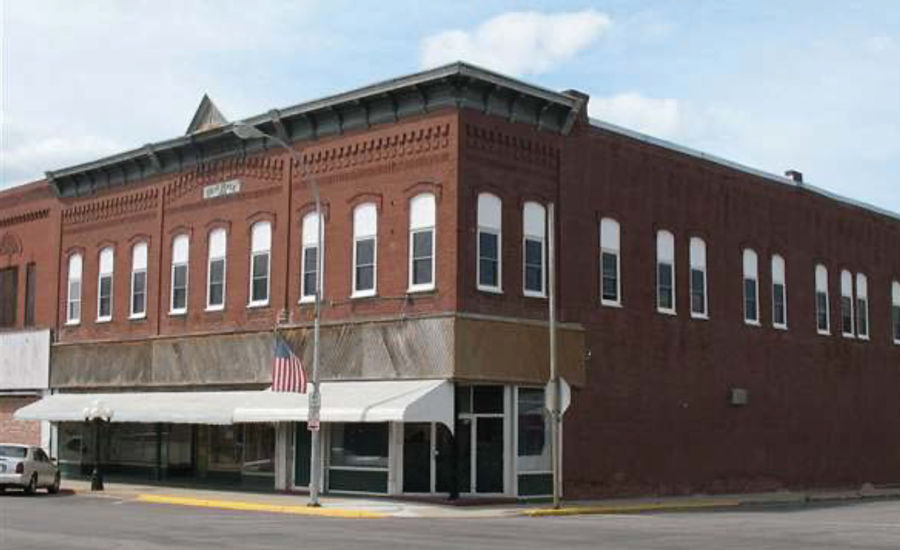
Developer Luis Hidalgo purchased this former Opera House on Long Prairie’s main street in 2021. His company, Hidalgo Investments, aims to provide proper housing and commercial spaces for the local Latino and immigrant residents and entrepreneurs in the Long Prairie and Todd County areas. After renovating three commercial spaces on the first floor of the Opera House, the project needed predevelopment support for the design and construction of 8 units of rental housing on the upper floors. Mr. Hidalgo was connected to GMHF’s Emerging Developers Program through partners at the Initiative Foundation and was able to receive a predevelopment grant to move the project forward.

BLUU COOPERATIVE HOUSING
NORTH MINNEAPOLIS, MN
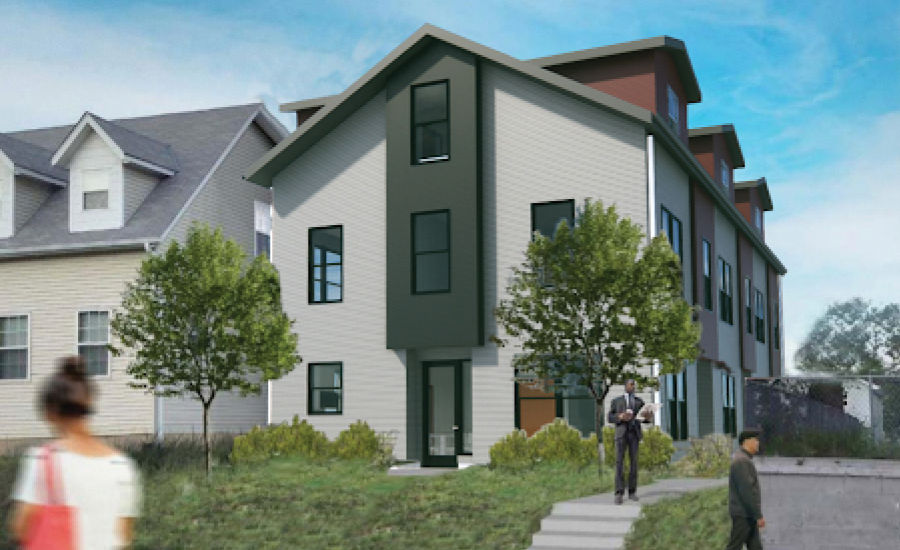
Black Lives of Unitarian Universalism (BLUU) partnered with Urban Homeworks to develop 3 side-by-side townhomes that will be sold to eligible homebuyers with incomes at or below 60% AMI. The homes will be part of a land trust and feature 4 bedrooms and 3.5 bathrooms. They are the first of a total of 24 units to be developed and formed into a cooperative.
This is an inaugural project for BLUU. They are a Black-led organization committed to justice-making and liberation through faith. BLUU’s vision for cooperative housing stems from their vision of helping stabilize Black and Indigenous families through truly affordable housing. Their values center around honoring the inherent worth and dignity of every family.

WEALTH CREATIONS HOMES
DEER RIVER AND CASS LAKE, MN
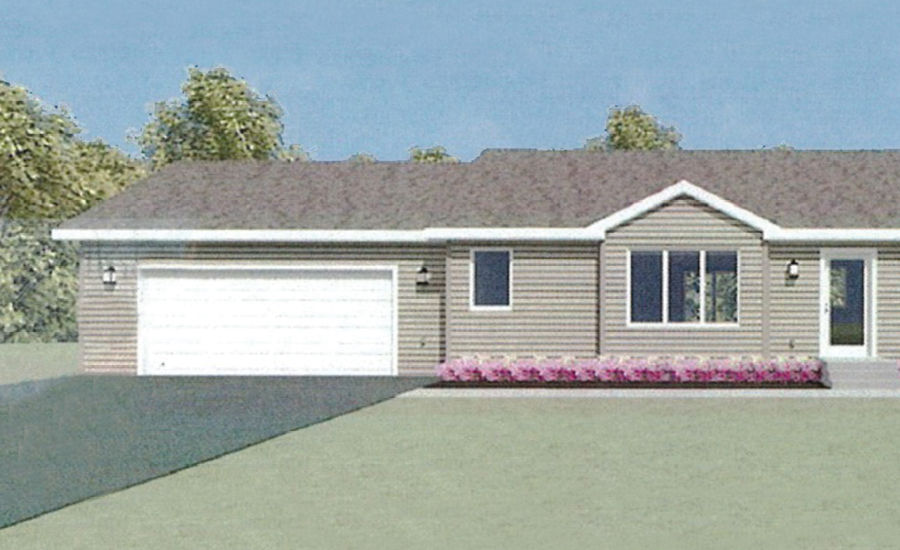
Leech Lake Financial Services (LLFS), a nonprofit corporation, has a mission to promote the economic well-being of individuals and families by providing financial products and education grounded in trust, ethical practices, and Anishinaabe values. LLFS provides services to prospective homebuyers, including credit coaching, financial training, education, downpayment assistance, closing cost assistance, and homebuyer counseling. Unfortunately, many of their program participants struggle to find affordable homes to purchase. This project will create 15 single-family homes affordable to families earning 80% AMI in the communities of Deer River and Cass Lake, promoting equitable access to homeownership, increasing the supply of affordable housing, and creating opportunities for building family wealth.


TRANSFORMING COMMUNITIES through partnership.
Housing & Health Initiative
Advancing investment in the preservation and development of affordable housing, the most impactful social determinant of health.
Stable housing is foundational for healthy people and healthy communities. Our Housing & Health Initiative continues to convene healthcare organizations and connect housing experts to advance projects that create and preserve affordable housing in Minnesota.
Peter Ebnet
Director of Policy & Program Development
pebnet@gmhf.com
2024 ACTIVITIES AND ACCOMPLISHMENTS
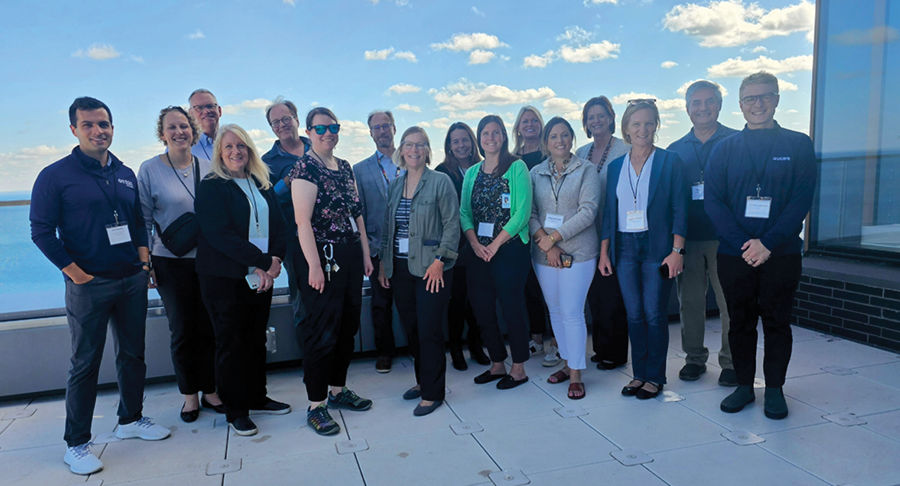
The third year of the initiative focused on supporting and expanding Healthcare for Housing Minnesota, a coalition comprised of Housing & Health Fellows Program graduates and new members. They convened quarterly to focus on shared learnings and peer exchange, continued education related to community impact investing, and creating a collective voice from the healthcare sector on housing as a key social determinant of health. Healthcare for Housing Minnesota includes some of the largest healthcare systems in Minnesota; Allina, Blue Cross MN, CentraCare, Children’s MN, Essentia Health, Fairview, and UCare. Other participating members include Sanford Health, HealthPartners, the Mayo Clinic, and the Council of MN Health Plans.
The coalition developed their first shared healthcare policy agenda related to affordable housing, which included advancing housing infrastructure bonds, increasing emergency rental assistance funding, creating a task force to simplify housing support resources, and advancing a call for Minnesota to pursue an 1115 Health-Related Social Needs Waiver for Medicaid with other advocacy lead partners.
HEALTHCARE RELATED HOUSING INVESTMENTS
GMHF helped advance two federally qualified health clinic projects (Native American Community Clinic and Neighborhood Healthsource) that are each colocated with new affordable housing developments. GMHF provided technical assistance and financing commitments to support the housing portion of the Native American Community Clinic, while the other project is still in an early stage of development.
Several members of the Healthcare for Housing Minnesota Coalition donated land and/or buildings for housing developments and other uses (CentraCare, Essentia, Mayo, and Sanford). Land donation for affordable housing is an area of opportunity with healthcare institutions as they often own land around their facilities that will not all be used for institutional purposes.
GMHF is working directly with individual healthcare organizations to encourage social impact investing, including providing development capital, equity investment, grants, and land and building donation, to preserve and create new affordable housing throughout Minnesota.
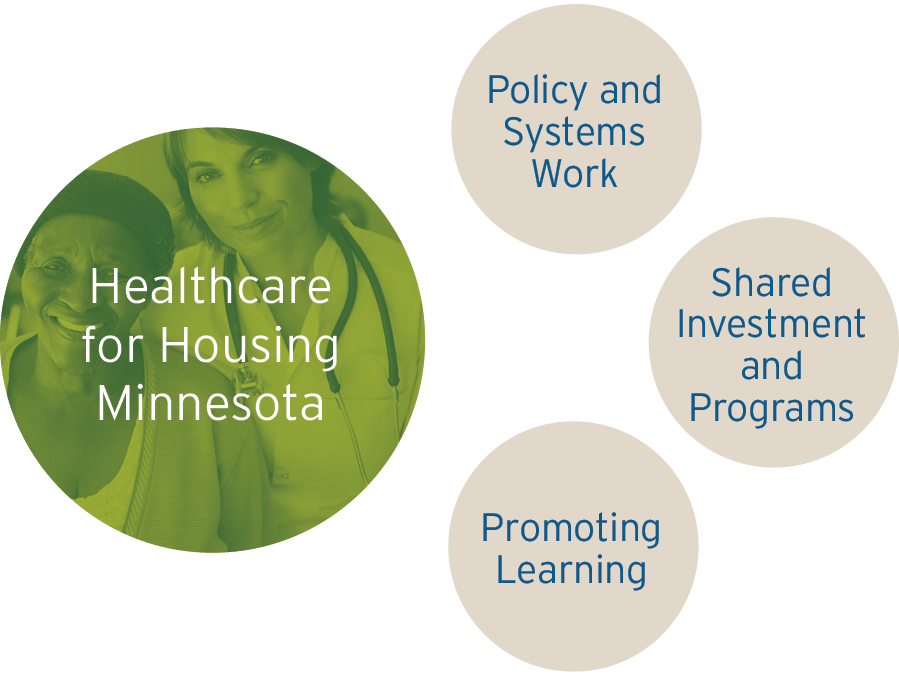
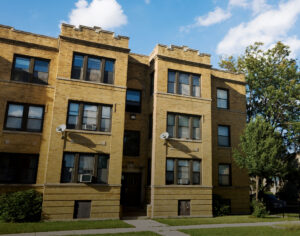
GMHF LENDING and EQUITY
Leveraging experience and capital to support affordable housing development and preservation in Minnesota.
Rural and Tribal Capacity Building Program
Addressing affordable housing needs in rural communities.
The Rural and Tribal Housing Capacity Building Program helps bring affordable housing projects from concept to completion by offering technical assistance, planning support, and grants. The Program serves rural and Tribal communities, local governments, and nonprofit and private developers, helping them navigate the many barriers to building and preserving affordable housing in rural Minnesota.
Nate Dorr
Rural and Tribal Capacity
Building Program Manager
ndorr@gmhf.com
2024 PROGRAM HIGHLIGHTS
The Rural and Tribal Capacity Building Program delivered on GMHF’s strategic commitments to build community capacity, address disparities and lack of equitable access and opportunity, and advance housing policy and systems change. During the second year of this program, GMHF directly supported rural and Tribal housing initiatives, built stronger partnerships, and supported locally driven Housing solutions.
GMHF staff and consultants assisted numerous projects with capacity building in 2024. At the end of the year, GMHF had 36 projects in our tracking matrix, all in various stages of development. Here are just a few examples to showcase the array of capacity building GMHF can provide through the Rural and Tribal Capacity Building program:
- GMHF assisted Stevens County and the City of Crookston with navigating workforce housing opportunities, including site identification, public funding resources, and guidance throughout the development process.
- Support was provided to the Itasca County Housing Study, which identified a need for 235 single-family units, 370 rental units, and 270 senior housing units through 2029. GMHF financially contributed to this project.
- GMHF partnered with Central Minnesota Housing Partnership and Region Five Development Commission to facilitate a community planning process for the Cass Lake Bena School District to consider their options on a 75-acre parcel of land the district owns.
GMHF also strengthened our statewide partnerships this year:
- Through supporting the rollout and promotion
of the Minnesota State Housing Tax Credit to generate local investments in affordable housing with Minnesota Housing Partnership and Minnesota Housing. - By developing an information feedback loop for local advocacy and policy work. This includes anti-NIMBYism, narrative change work, and advocating for state-level policies that work in rural communities through the Heading Home Minnesota Funders Collaborative.
- In supporting Minnesota Housing Partnership’s Housing Institute 9 with Iron Range area communities through sponsorship and program participation.
GMHF
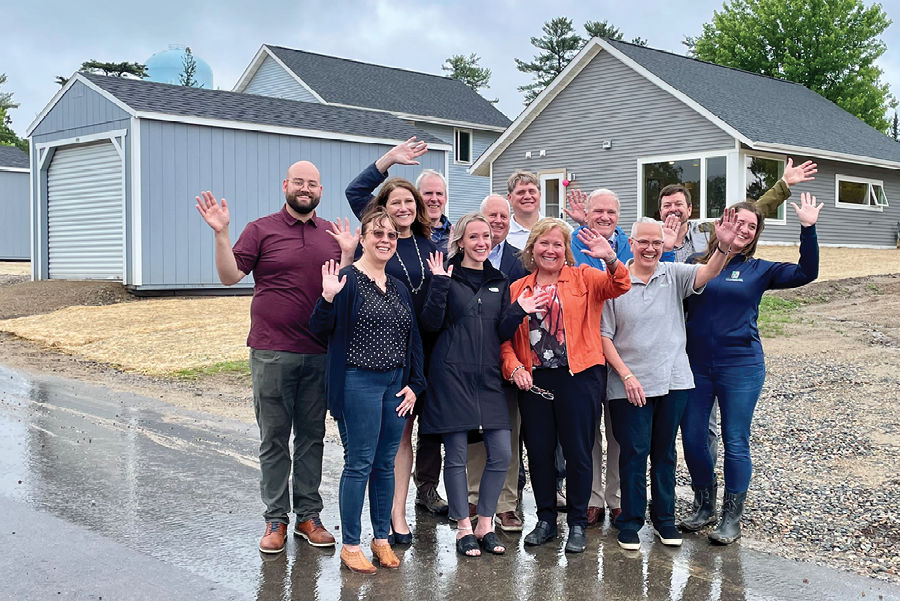
GMHF celebrated the opening of four single-family homes in Grand Rapids using Itasca County HRA’s Community Land Trust model with community partners in June 2024. GMHF provided downpayment assistance for this project.

Revolving Loan Fund
In 2024, GMHF closed $52.2M in development loans to create or preserve affordable homes across Minnesota. Developments are in areas that need workforce housing to support economic growth as well as smaller rural communities where housing stock is in short supply.
John Rocker
Managing Director of Lending
jrocker@gmhf.com

LITTLE EARTH
MINNEAPOLIS, MN
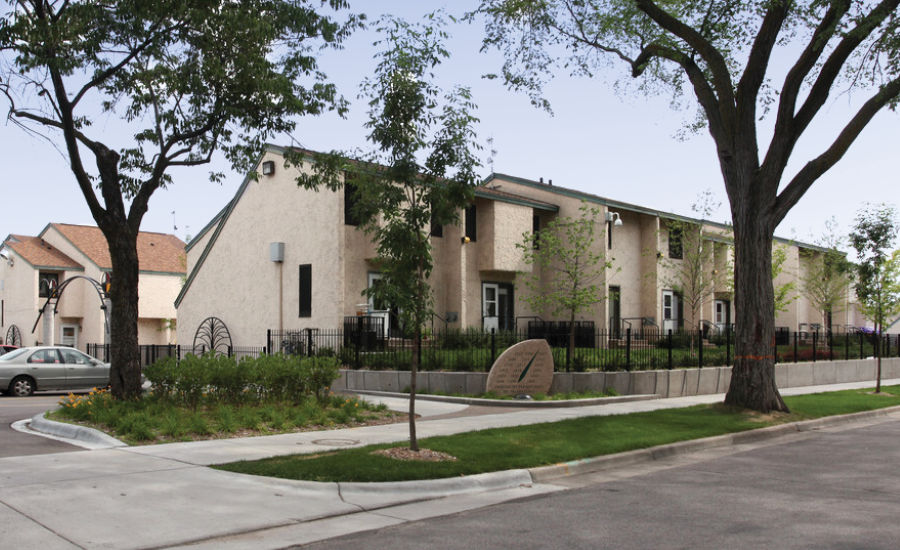
Little Earth has 212 units of project-based Section 8 where residents pay no more than 30% of their income towards rent and it is therefore affordable to households below 30% AMI. Twenty-two units are set aside for High-Priority Homeless households, and 22 units are set aside for people with disabilities.
Little Earth is the only Indigenous-preference project-based Section 8 community in the United States. It has been continuously operated by a 100% Native resident governing body and an executive team that is 75% Native. Resident services include education, workforce development, health and wellness, and life skills, all presented in a holistic and culturally relevant manner.

PERSPECTIVES
ST. LOUIS PARK, MN
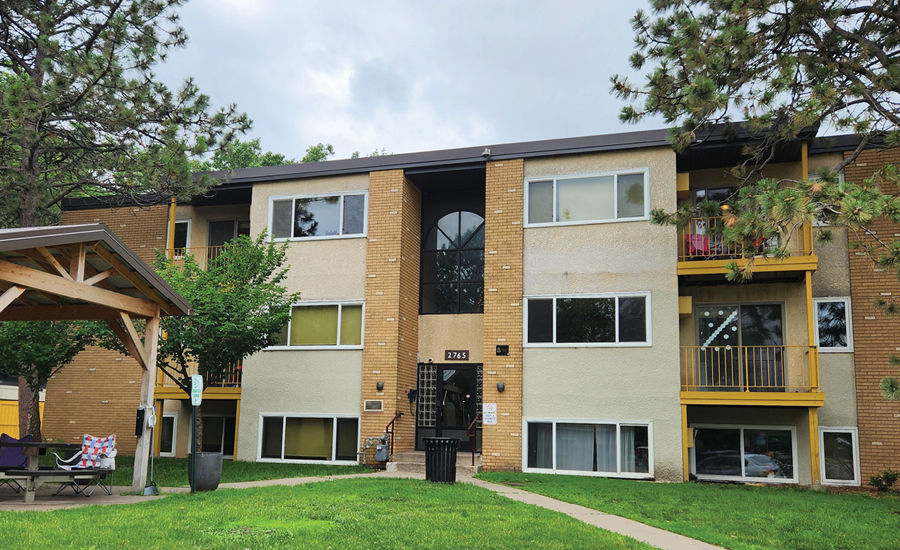
Perspectives Apartments, 56 units being acquired and rehabilitated by Trellis, includes 22 units supported by a project-based Section 8 contract that are income-restricted at 30% of AMI, and the remaining 34 units are restricted at or below 50% AMI. All of the units will include rental assistance through either the Section 8 contract that will be transferred, or through site-based housing support provided by Missions, Inc. as the service provider. The previous owner declared bankruptcy and the supportive housing it provided was at risk of loss without a new owner. With GMHF’s help, the project will continue to offer supportive services to mothers at risk of homelessness and struggling with chemical dependency. GMHF’s ability to step in as the primary lender and work quickly to help transfer ownership of this property to Trellis has been key to preventing the loss of this critically needed supportive housing.

These supportive units serve indigenous people and mothers who are at risk of homelessness.
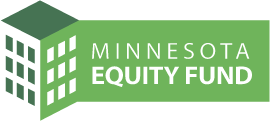
Minnesota Equity Fund
In 2024, MEF assembled $38.5M in socially motivated equity capital to finance 278 rental homes, including 120 new units and 158 preserved units.
MEF makes significant Low Income Housing Tax Credit (LIHTC) equity investments in affordable housing in Minnesota and beyond with support from UnitedHealth Group and Cinnaire’s multi-investor funds.
John Errigo
Managing Director of Equity Investing
& NOAH Fund Manager
jerrigo@gmhf.com
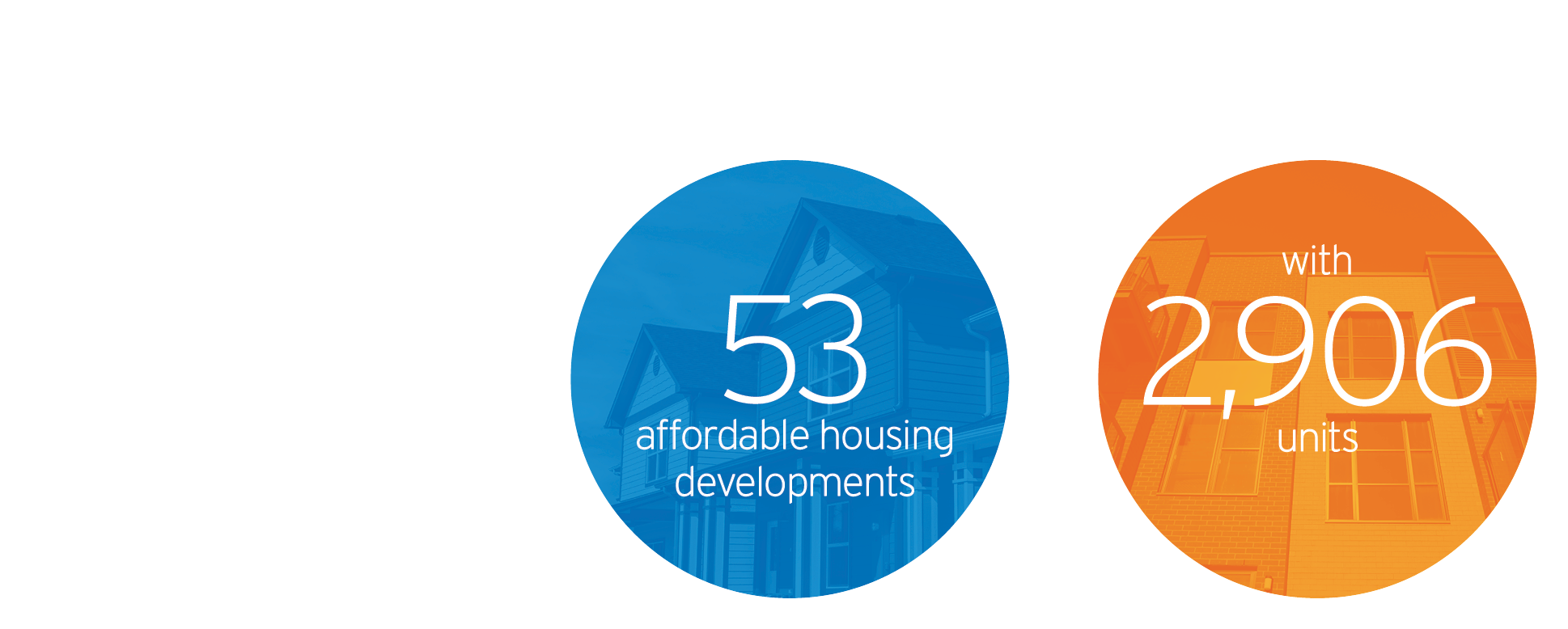
* GMHF and MEF resources are sometimes used to finance the same developments so there may be some overlapping of unit counts.
MARSHALL AVENUE FLATS APARTMENTS
ST. PAUL, MN
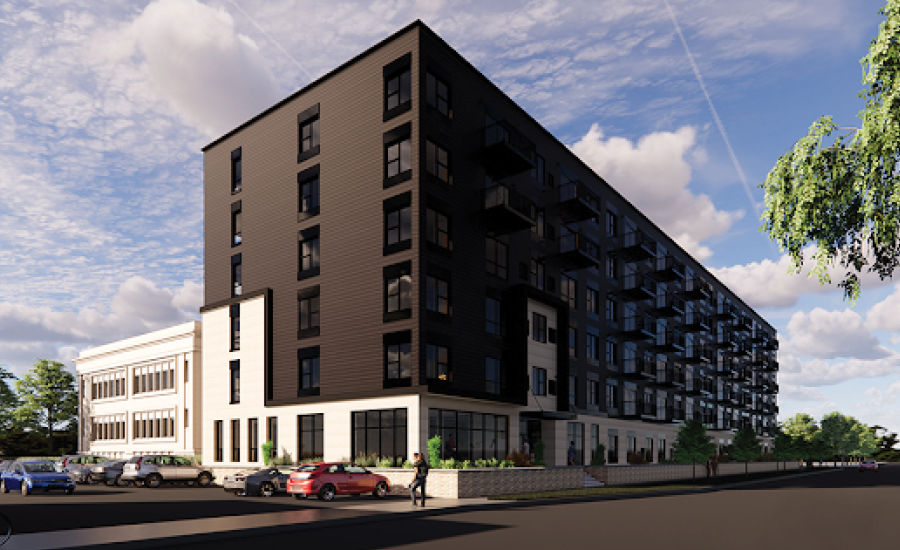
Marshall Avenue Flats is a six-story, 98-unit new construction housing development from developers Richard Pakonen and Clinton Blaiser. The building is near the intersection of Snelling Avenue and Marshall Avenue in St. Paul in a neighborhood that has recently experienced considerable urban renewal. The building is in a Qualified Census Tract but near several market rate properties with some of the highest rents in St. Paul, thus creating a valuable affordable housing option in the area. The development has 44 one-, 49 two-, and 5 three-bedroom units that are restricted to the 30%, 50%, and 60% AMI levels, providing affordable workforce housing for individuals, couples, and families with children.

MAPLE HILL APARTMENTS
RED WING, MN
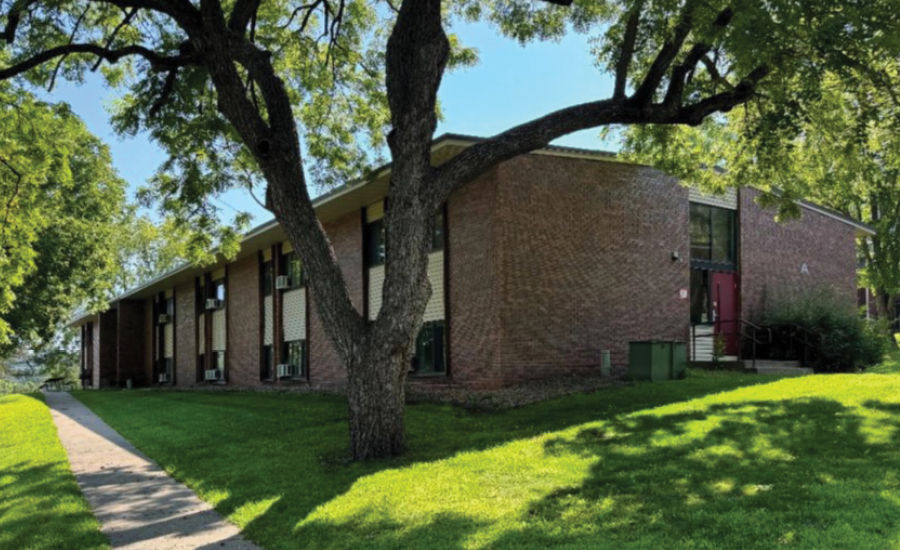
Maple Hills Apartments, located in Red Wing, consists of 6 two-story walk-up buildings with 72 one-, 16 two-, and 8 three-bedroom units. CommonBond Communities will extensively rehabilitate the 53-year-old property, which benefits from a project-based Section 8 HAP contract. The federal rental assistance was considered at risk of loss due to the deteriorating physical condition of the aging buildings. Completion of the capital improvements will ensure that the property continues to serve its extremely low-income residents who, on average, have an annual household income of less than $15,000, which is below the 15% AMI level for Goodhue County.

These apartments offer unit options with one, two, or three bedrooms to help serve a variety of family sizes.
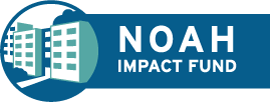
NOAH Impact Fund
In 2017, NOAH Impact Fund mobilized $32.5M of social impact capital; NOAH Pool I went on to preserve 701 units of market rate, unsubsidized housing. In 2024, NOAH Impact Fund launched NOAH Pool II with another $33.5M of social impact capital, with a goal of preserving the affordability of another 500+ units.
NOAH, or “naturally occurring affordable housing,” refers to residential rental properties that offer affordable rents but are not subsidized by government programs. Most existing affordable housing falls under this category. Preservation of these units is critical for preventing displacement of low-income families and maintaining community assets as these properties age.
John Errigo
Managing Director of Equity Investing
& NOAH Fund Manager
jerrigo@gmhf.com

NOAH Impact Fund creates opportunity for socially motivated investors and rental property owner-operators in key areas:
- Maintaining Affordability: Creating long-term, affordable options for properties more likely to lose affordability if acquired.
- Supporting Opportunity: Preserving properties near schools, jobs, transit, and other opportunities for low-income, cost-burdened households.
- Preventing Displacement: Ensuring people can stay in their homes and afford to live there long-term, supporting stable communities.
- Stabilizing Properties: Supporting necessary development and management changes so that residents have quality affordable housing.
THANK YOU TO NOAH IMPACT FUND POOL II INVESTORS

Staff and Board of Directors
2024 STAFF
Andrea Brennan
President & CEO
Rhiannon Caffee
Loan Closer
Nate Dorr
Rural and Tribal Capacity Building Program Manager
Peter Ebnet
Director of Policy and Program Development
John Errigo
Managing Director of Equity Investing & NOAH Fund Manager
Melinda Guajardo
Administrative Assistant
Kayla Hemmerle
Asset Management Coordinator
Matt Holland
Controller
Angie Johnson
Director of Capital Development and Investor Relations
Wes Johnson
Chief Underwriter & Senior Loan Officer
John Kieser
Senior Accountant
Kate Knowles
Financial Analysis Manager, Banking & Compliance
Joshua Kolb
Senior Asset Manager
Holly Krachmer
Closing Manager
Alexis Lancaster
Operations Manager
Kyle Larsen
Chief Financial Officer
Paul Marzynski
Investment Officer
Asher Michels-Allen
Loan Officer
Nikki Mohs
Senior Loan Officer
Eric Muschler
Director of Housing and Health Equity
Dusty Reese
Investment Officer
John Rocker
Managing Director of Lending
Irene Ruiz-Briseño
Emerging Developer Program Manager
Marcela Sanchez
Program Assistant
Megan Sanders
Loan Officer
Jordan Sosa
Finance Manager
Barb Sporlein
Chief Operating Officer
Tyler Thompson
Senior Financial Analyst, Asset Management
Becky Tollefson
Construction and Lending Coordinator
Evan Uribe
Loan Officer
Genesia Williams
Director of Communications & Engagement
Mai Yia Yang
Senior Accountant
2024 BOARD OF DIRECTORS
Mitchell Berg
Bloomington, IN
Local Government and Community Development
Kim Bretheim
Minneapolis
Housing Studio Leader, LHB Architects, FAIA
Stephanie Cummings
Duluth
SVP Chief Retail Officer, National Bank of Commerce
Joseph Errigo
West Saint Paul
Retired, President & CEO, CommonBond Communities
Rosymar Hjermstad
Park Rapids
School of Graduate Studies and International Program Center, Bemidji State University
Natalie Jones
Rochester
Vice President Principal Banker, West Bank, Rochester
Cheryl Key
Lake City
Wabasha County Commissioner
Stephanie Klinzing
Elk River
Retired, Director, State Housing Agency
Angela Larson
Marshall
Family Services Director, United Community Action Partnership
Jennifer Mendoza
Wilmar
Career Development Navigator and Community Liaison, Comunidades Latinas Unidas En Servicio
Todd Prafke
St. Peter
City Administrator, City of Saint Peter
Jorge Prince
Bemidji
Mayor of Bemidji
Char Roberts
Red Lake
Finance Manager, Red Lake Band of Chippewa
Dale Roemmich
Sioux Falls, ND
Retired, President, First Farmers & Merchants National Bank
Nancy Vyskocil
Dent
Retired, President, Northwest Minnesota Foundation
2024 Financial Statements
| STATEMENT OF ACTIVITY | 2024 |
|---|---|
| Contributions | $30,859,314 |
| Program Service Revenues | $7,185,361 |
| Amortization of Present Value Discount | $1,573,209 |
| Interest and Dividends, Net | $2,288,529 |
| Unrealized Gain (Loss) on Investments | $(457,518) |
| Realized Gain (Loss) on Investments | $(440,197) |
| Total Revenue | $41,008,698 |
| Program Services | $21,356,409 |
| Management & General | $1,408,973 |
| Total Expense | $22,765,382 |
| Change in Net Assets | $18,243,316 |
| Net Assets, Beginning of Year | $128,299,937 |
| Net Assets, End of Year | $146,543,253 |
| BALANCE SHEET | 2024 |
|---|---|
| Cash | $15,232,388 |
| Restricted Cash | $6,657,990 |
| Investments, Current | $58,710,560 |
| Accounts Receivable | $5,883,763 |
| Loans Receivable | $72,064,194 |
| Other Current Assets | $226,053 |
| Total Current Assets | $158,774,948 |
| Fixed Assets | $1,351,028 |
| Long-Term Loans Receivable & Accruals | $144,485,873 |
| Investment in Subsidiary | $(5,327,013) |
| Other Long-Term Assets | $101,166 |
| Total Long-Term Assets | $140,611,054 |
| Total Assets | $299,386,002 |
| Accounts Payable | $951,026 |
| Accrued Payroll & Benefits | $134,753 |
| Deferred Revenue | $8,176,943 |
| Notes Payable, Current & Accrued Interest | $360,031 |
| Other Current Liabilities | $3,025,266 |
| Total Current Liabilities | $12,648,020 |
| Notes Payable, Long-Term | $138,225,216 |
| Other Long-Term Liabilities | $1,969,512 |
| Total Long-Term Liabilities | $140,194,728 |
| Total Liabilities | $152,842,749 |
| Net Assets Without Donor Restriction | $135,590,714 |
| Net Assets With Donor Restriction | $10,952,539 |
| Total Net Assets | $146,543,253 |
| Total Liabilities and Net Assets | $299,386,002 |
2024 GMHF Funders
Allina Health
Ameriprise Bank
Blandin Foundation
BMO
Bremer Trust
Bush Foundation
CNOTE
CommonSpirit Health
Douglass Bradenborg Family Foundation
F.R. Bigelow Foundation
Graves Foundation
Margaret A. Cargill Philanthropies
McKnight Foundation
Opportunity Finance Network
Saint Paul and Minnesota Foundation
U.S. Bancorp Impact Finance
U.S. Bank
U.S. Department of Treasury
Wells Fargo
Wilson Foundation
Yield Giving (MacKenzie Scott)
